All English posts
Sites at the 22nd Winter Olympic Games.
6 Feb 2014 Here we are. On February 7th the XXII Winter Olympic Games start in Sochi. World’s attention will be focused on the tracks in Krasnaya Polyana and on the rinks and stadiums in Imereti Valley. 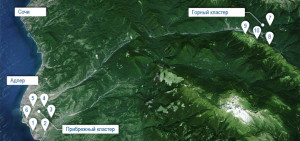
Russian newspaper “MK” has offered to its readers a plan of Big Sochi.
The Olympic Games will be held in two clusters: the coastal and mountain. You can reach them on a specially designed electric train “Lastochka” which runs along the routes “Sochi – Olympic Park (Coastal cluster)” and “Sochi – Krasnaya Polyana” (Mountain cluster). “Lastochka” carries passengers to the airport, Matsesty, stations Esto-Sadok and Adler.
Coastal Cluster
1. Stadium “Fischt”
2. Palace “Iceberg”
3. “Adler-Arena”
4. “Ice Cube”
5. Palace “Bolshoy”
6. Arena “Shayba”
Mountain Cluster
7. Complex “Laura”
8. “Rose-farm”
9. Springboard complex “Russian hills”
10. Center Luge “Sledge”
Nearby Touristic Places
Stalin’s dacha,
Nature Museum of Sochi National Park,
Mountain Ahune,
Kennel monkeys Adler,
Sculpture “Horse in the coat”,
Sochi Art Museum,
Friendship Tree.
John Paul II’s personal papers are to be published by the Krakow-based Znak Publishing Institute, even though the late Polish Pope asked for the documents to be burnt after his death.
Znak’s director Henryk Wozniakowski said the papers include the Pope’s prayers and reflections as well as notes showing the Pope’s concern for those dear to him and for the Church.
The 640-page book, entitled ‘I am in God’s hands. Personal notes 1962-2003’ will hit the bookstores on 5 February.
In his will, John Paul II wanted his notes burnt after his death but his personal secretary, Stanisław Dziwisz, now the Archbishop of Kraków, did not fulfil the Pope’s wish.
Explaining his decision in the preface to the book, Dziwisz,writes that the Pope’s personal notes are of historical importance and “the key to interpreting his spirituality, his innermost self: his relationships with God, others and himself”.
Pope John Paul II will be canonized, together with Pope John XXIII, on 13 April.
Source: Radio Polska
Poland, No conspiracy in Sikorki’s death.
3 Jan 2014A five-year investigation into the death of Polish World War II leader General Wladyslaw Sikorski has found no evidence to support conspiracy theories that he was murdered.
Institute of National Remembrance (IPN) has found no proof that Poland’s wartime prime minister was either murdered prior to the flight, or that the plane crash itself was caused by sabotage. 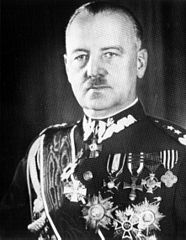
In a statement, IPN concluded that there is “no reasonable doubt” in the question of his boarding the plane alive.
The Polish leader’s death on 4 July 1943 remains a riddle to many, in spite of an official wartime investigation that claimed the crash was an accident.
Sikorski, who headed the Polish government-in-exile in London, was flying back to England after visiting Gibraltar when his Liberator plane plunged into the sea, shortly after take-off.
Apart from the pilot, who survived with broken limbs, all aboard apparently died immediately, although some bodies were never recovered, further fuelling conspiracy theorists.
Accusations have been levelled at Russia, Britain and a clique of Polish army officers over the years.
An official British military investigation blamed the crash on jammed controls in the cockpit.
As revealed in March 2013 by Piotr Dabrowski from IPN, besides archival work, two witnesses have been interviewed for the current probe in England and Spain.
The first was a radio operator who participated in the British navy’s salvage operation, immediately after the plane went down. The second was a diver who helped extract bodies from the wreck.
Claims that Sikorski had been murdered prior to take off were largely dispelled following the exhumation of his remains in 2008 at Wawel Cathedral, Krakow.
Noted British historian Professor Norman Davies told that “no reputable historian” had ever insisted that sabotage was the cause of Sikorski’s death.
Polskie Radio – Articles
“As of January 2014, restrictions are lifted on Romanians and Bulgarians seeking long-term work in other EU member states. But experts say expectations of massive immigration from the two countries are likely unfounded.
Ideally, Nicu would like to stay in his home country, Romania. He worked as an electrician for a large electricity provider in western Romania for 25 years. His employer used to be a state-owned company until it was taken over by a foreign investor.
Many of his colleagues lost their jobs in the last couple of years. 45-year-old Nicu was initially allowed to stay. “But because of staff shortages, I had to pull double shifts,” said Nicu, who doesn’t want his last name published. “I was so tired that sometimes I almost fell asleep while I was driving.” …
Article – Deutsche Welle
Latvia, the 18th member of the eurozone.
1 Jan 2014 Andris Vilks said the recent events in Ukraine, which decided at the last minute to turn down an integration agreement with the EU in favour of closer ties with Russia, demonstrated why the Baltic state of 2m people is joining the euro. “Russia isn’t going to change. We know our neighbour. There was before, and there will be, a lot of unpredictable conditions. It is very important for the countries to stick together, and with the EU,”, added the finance minister. 
Latvia still has close ties with Russia, with about 40 per cent of the bank deposits in the country coming from ex-Soviet states. In the country, which is the 18th member of the euro area, opponents of the currency switch outnumber proponents two-to-one as public expectations for accelerating inflation mount, opinion polls show. Residents are also bracing for taking on new responsibilities in the currency union.
Concern that inflation will accelerate is rising even after consumer prices fell 0.4 percent in November from a year earlier, the sixth month this year without an increase. The Finance Ministry estimates prices will rise 2.3 percent next year as the economy expands 4.2 percent.
“Joining the euro marks the completion of Latvia’s journey back to the political and economic heart of our continent, and that is something for all of us to celebrate,” EU Economic and Monetary Affairs Commissioner Olli Rehn said in a statement.
“Immediately after Latvia joins the eurozone, I imagine we’re going to see an actual spike in dubious money flowing in,” said Mark Galeotti, a professor at New York University who researches organized crime in the former Soviet Union.
For years, Latvia’s political and financial leaders had hoped to create a mini-Switzerland in Eastern Europe — a place where capital in unstable countries such as Russia or Kazakhstan could either park for a while or channel its way further west to banking meccas like Zurich or London.
Lithuania adopts the euro.
1 Jan 2014 Lithuania is the 19th European state to adopt the continental currency. 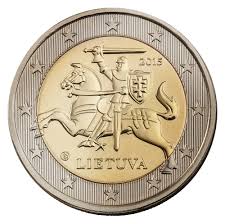 The euro gives the country more freedom in negotiating business with Russia, said Valdas Adamkus, who was president of Lithuania for about a decade until 2009. It provides an extra measure of geopolitical security.
The euro gives the country more freedom in negotiating business with Russia, said Valdas Adamkus, who was president of Lithuania for about a decade until 2009. It provides an extra measure of geopolitical security.
At 0.4 percent, its inflation rate is just a hair above the euro zone average of 0.3 percent, and its 9.5 percent unemployment rate is right in the middle of the pack, and comfortably below the zone average of 11.5 percent. Lithuania’s 1.3 percent real GDP growth rate beats both of its Baltic partners and is again well above the -2.2 percent Euro Zone average.
Eastern Partnership, as one of the priorities of the Lithuanian Presidency of the Council of the EU, is a natural choice, determined by the Lithuanian and the EU interest to have safe, stable, economically strong and pro-European Eastern neighbours. Our goal is to have pro-active and efficient Eastern Partnership policy that would bring tangible results for these countries and their people. This could be achieved through the joint efforts of the EU institutions, EU Member States and Eastern Partners themselves. 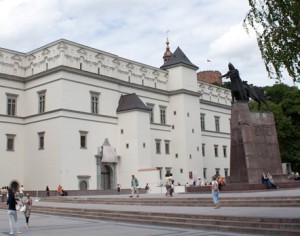
Through the Eastern Partnership, the EU strengthens its bilateral and multilateral cooperation with the six Eastern European partners: Armenia, Azerbaijan, Belarus, Georgia, Moldova and Ukraine, supports reform processes of these countries, and seeks to bring them closer to the EU.
Main results
Over the first four years of its implementation, Eastern Partnership initiative has brought a number of tangible results:
- Association Agreements, including Deep and Comprehensive Free Trade Areas, as their integral parts, have been negotiated with Ukraine, the Republic of Moldova, Georgia and Armenia; good progress has also been achieved in respective negotiations with Azerbaijan;
- considerable progress has been made in the area of visa facilitation and liberalization: 5 out of 6 partners already have or will soon have Visa Facilitation Agreements; 3 of them managed to advance even more – they now have Visa Liberalization Actions Plans, prepared specifically to them, full and effective implementation of which will bring these countries straight to the visa free travels with the EU;
- the multilateral cooperation dimension has been established and further strengthened: it now includes senior officials and experts working in a number of different areas, from agriculture and environment to trade, migration and CSDP;
- sectorial cooperation has also been enhanced, with the first Eastern partnership ministerial meetings in the fields of Justice and Home Affairs, and Transport, held in October 2013, in Luxembourg;
- cooperation between societies at large has been started and such formats as Civil Society Forum, Conference of the Regional and Local Authorities (CORLEAP), Business Forum and Youth Forum are now meeting on a regular basis, thus contributing to the monitoring of the implementation of the Eastern Partnership, but also to the policy shaping.
The third Eastern Partnership Summit in Vilnius
The third Eastern Partnership Summit in Vilnius will be held on the 28-29 November, 2013. The leaders and other high level representatives of the EU institutions, 28 EU Member States and the 6 Eastern European Partner States are expected to take part in the EaP Vilnius Summit. The event will be hosted by the President of the Republic of Lithuania Dalia Grybauskaitė and chaired by the President of the European Council Herman Van Rompuy.
Eastern Partnership Summits are held every two years (the first two Summits took place in the Czech Republic (Prague), 7 May, 2009, and in Poland (Warsaw), 29-30 September, 2011). During these meetings, the implementation and the results of the Eastern Partnership are discussed, the objectives for the next two years are determined and the prospects for the future are drawn.
Source: official site of the Summit
* * *
Joint statement by President of the European Council Herman Van Rompuy and President of the European Commission José Manuel Barroso on Ukraine
Concerning the Ukrainian decision to suspend temporarily the preparations for signing the Association Agreement and Deep and Comprehensive Free Trade Area (DCFTA), the European Union’s position remains clear. The offer of signing an unprecedented Association Agreement and a DCFTA is still on the table. This requires the necessary political will by the Ukrainian leadership, determined action and tangible progress on the conditions set out in December 2012.
Important progress has already been achieved by Ukraine. We are convinced that signing the Association Agreement and a DCFTA, the most ambitious agreement the European Union has ever offered, provides the best possible support for Ukraine’s economic situation, reform course and modernisation in view of building a prosperous and stable future for all Ukrainians. The EU stands ready to be more open and more supportive to those who are willing to engage in reforms and modernisation.
While being aware of the external pressure that Ukraine is experiencing, we believe that short term considerations should not override the long term benefits that this partnership would bring. However the European Union will not force Ukraine, or any other partner, to choose between the European Union or any other regional entity. It is up to Ukraine to freely decide what kind of engagement they seek with the European Union. Ukrainian citizens have again shown these last days that they fully understand and embrace the historic nature of the European association.
We therefore strongly disapprove of the Russian position and actions in this respect. The Association Agreement and a DCFTA are opportunities to accompany our common neighbours towards modern, prosperous and rule-based democracies. Stronger relations with the European Union do not come at the expense of relations between our Eastern partners and their other neighbours, such as Russia. The Eastern Partnership is conceived as a win-win where we all stand to gain. The European Union continues to stand ready to clarify to the Russian Federation the mutual beneficial impact of increased trade and exchanges with our neighbours, whilst fully respecting the sovereignty and independence of our Eastern Partners and the bilateral nature of Association Agreement and DCFTAs.
The European Union looks forward to the Eastern Partnership Summit in Vilnius this week. It will be an important moment to take stock of the situation and take forward the relations with our Eastern partners.
EU’s budget 2014-2020 adopted at last.
21 Nov 2013Members of the European Parliament (MEPs) voted 537 in favour (Conservatives, Socialists) to 126 against (Greens and radical left) to adopt the EU’s budget for 2014 to 2020.
Known as the Multi-annual Financial Framework (MFF), it provides for 908 billion euros in payments against 960 billion euros in funding commitments, 3.7 percent and 3.5 percent less than in the previous 2007-2013 budget.
A third (37 percent) of the budget will be allocated to the Common Agricultural Policy and 34 percent to Cohesion and Regional policy.
The vote marks the end of a bitter battle in which the budget went back and forth between austerity-minded governments and the EU’s executive European Commission and MEPs, who wanted more funds to boost growth and jobs.
UN annual climate conference in Warsaw.
11 Nov 2013” Negotiators from around the world begin meeting in Warsaw for an annual climate conference. In the past, Poland has made its mark by blocking the EU from calling for stricter greenhouse gas emissions limits. 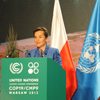
For Christiana Figueres the facts are clear. “There is a very real necessity to reduce greenhouse gas emissions,” said the UN Framework Convention on Climate Change’s executive director. A report from the UN environment agency UNEP released at the beginning of November showed just how real this necessity is: we can only meet the target of limiting global warming to 2 degrees Celsius (3.4 degrees F) if greenhouse gas emissions worldwide are drastically reduced in the years leading up to 2020….
The likelihood that big countries come forward at during the climate conference in Warsaw, which begins Monday (11.11.2013) with binding promises to reduce their emissions is low. This is partly due to the fact that the European Union has so far failed to set a good example by agreeing on an ambitious goal for its own carbon dioxide reductions…. “
Full Article – Deutsche Welle
Czech Social Democrats (ČSSD) won a slim victory in parliamentary election and face a tough task forming a government. A tiny 2 percentage point outcome over the new Ano party of billionaire Andrej Babiš and the inability to get more than 25 percent of the vote were a huge disappointment for party leader Bohuslav Sobotka.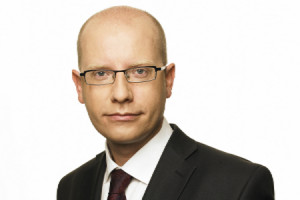
In third place was the Communists Party of Bohemia and Moravia (KSČM) with a strong showing that resulted in almost 15 percent of the vote.
The Civic Democratic Party (ODS), which has long dominated Czech politics, managed just 7.5 percent of the vote, a predictable outcome that pushes them to the fringes of Czech politics. The party’s downfall was largely due to the scandal that toppled the outgoing government.
The election result leaves the central European country of 10.5 million people facing the prospect of protracted political haggling and of another weak and unstable government just as the Czech economy emerges from a lengthy recession.
“If the lower house of parliament is fragmented, we will face tough negotiations on forming government,” said Sobotka. “The Social Democrats are prepared to take on this tough negotiation and we will try to form a reasonable, stable cabinet,” he said, adding he was ready to talk to all parties except the center-right parties who led the last government.
Election results
Social Democrats (ČSSD): 20.46%; 50 seats
Ano: 18.65%; 47 seats
Communists (KSČM): 14.91%; 33 seats
TOP 09: 11.99%; 26 seats
ODS: 7.72%; 16 seats
Dawn: 6.88%; 14 seats
Christian Democrats (KDU-ČSL): 6.77%; 14 seats
From The Prague Post and Reuters
Welcome
We are a group of long experienced European journalists and intellectuals interested in international politics and culture. We would like to exchange our opinion on new Europe and Russia.
Categories
- Breaking News (11)
- CIS (129)
- Climate (2)
- Energy&Economy (115)
- EU Eastern Dimension (85)
- Euro 2012 – Sochi 2014 – World Cup 2018, Sport (43)
- Euro-Integration (135)
- History Culture (198)
- International Policy (261)
- Military (74)
- Interviews (18)
- Italy – Italia – Suisse (47)
- Odd Enough (10)
- Poland and Baltic States (126)
- Religion (31)
- Russia (421)
- Survey (4)
- Turning points (4)
- Ukraine (176)
- Российские страницы (113)
Archives
- November 2020
- October 2020
- September 2020
- August 2020
- July 2020
- May 2020
- April 2020
- March 2020
- January 2020
- December 2019
- November 2019
- October 2019
- September 2019
- August 2019
- July 2019
- June 2019
- May 2019
- April 2019
- March 2019
- February 2019
- December 2018
- November 2018
- October 2018
- September 2018
- August 2018
- July 2018
- June 2018
- May 2018
- April 2018
- March 2018
- February 2018
- January 2018
- December 2017
- November 2017
- October 2017
- September 2017
- August 2017
- July 2017
- May 2017
- March 2017
- January 2017
- December 2016
- November 2016
- October 2016
- September 2016
- July 2016
- June 2016
- May 2016
- April 2016
- February 2016
- January 2016
- November 2015
- October 2015
- September 2015
- June 2015
- April 2015
- March 2015
- February 2015
- January 2015
- December 2014
- November 2014
- October 2014
- September 2014
- August 2014
- July 2014
- June 2014
- May 2014
- April 2014
- March 2014
- February 2014
- January 2014
- December 2013
- November 2013
- October 2013
- September 2013
- August 2013
- July 2013
- June 2013
- May 2013
- April 2013
- March 2013
- February 2013
- January 2013
- December 2012
- November 2012
- October 2012
- September 2012
- August 2012
- July 2012
- June 2012
- May 2012
- April 2012
- March 2012
- February 2012
- January 2012
- December 2011
- November 2011
- October 2011
- September 2011
- August 2011
- July 2011
- June 2011
- May 2011
- April 2011
- March 2011
- February 2011
- January 2011
- December 2010
- November 2010
- October 2010
- September 2010
- August 2010
- July 2010
- June 2010
- May 2010
- April 2010
- March 2010
- February 2010
- January 2010
- December 2009
- November 2009
- October 2009
- September 2009
- August 2009
Our books




